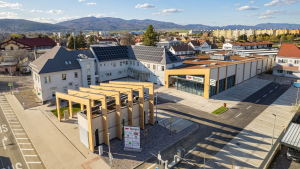
Poland's industrial sector remains in great shape. Up to 2.8 million sqm of space was leased and 1.3 million sqm delivered to market from the beginning of January to the end of September 2018. Nearly 2.1 million sqm of industrial space remains under construction, according to JLL.
“So far, each quarter of 2018 has seen a better result than the corresponding periods of the previous year, and total leased floor-space from January until the end of September hit 2.8 million sqm. However, since the beginning of 2018, net demand (excluding renewals) stands at almost 2.13 million sqm. The industrial sector in Poland continues to be predominantly driven by logistics operators, which to date has a 41% share of net demand in 2018, and retailers with 33%”, comments Tomasz Mika, Head of Industrial Poland, JLL.
Central Poland has been the most active location so far this year. One should note that 76% of the take-up in Q1 to Q3 was in the five major industrial market regions; however, all other markets, including emerging ones, saw activity from tenants.
Supply
So far in 2018, completions have involved parks with a total of 1.3 million sqm, with 676,000 sqm being delivered in Q3 alone. To beat the record set in 2017, the market needs some 950,000 sqm of new deliveries in Q4. This is very much possible, given the amount of space under construction; however, the lengthening of the development process may raise doubts that that amount will actually be delivered this year.
“Close to 2.1 million sqm of warehouse and industrial space currently remains under construction throughout Poland. Central Poland retained its position as the number one hot spot on Poland’s industrial and warehouse map, with new completions in the region surging to 527,000 sqm, constituting 40% of the total new space delivered nationwide. What is more, almost 500,000 sqm of space is currently under construction in Central Poland”, explains Maciej Kotowski, Consultant, Research and Consulting, JLL.
High levels of development activity were also seen in the Warsaw, Upper Silesia and Lubuskie regions with new projects in each of these regions exceeding 140,000 sqm. The "under construction pipeline" covers the entire country, as almost all regions saw some construction at the end of September 2018, including Tri-City (172,000 sqm), Szczecin (130,000 sqm) and Olsztyn (121,000 sqm).
“It is worth noting that the industrial market in Poland is seeing increasing popularity of last mile and SBU (Small Business Unit) facilities, which allow tenants to be closer to the final client and to adapt to the shortening of delivery times. To keep up with this trend, some market players have already introduced new platforms designed for urban logistics, for example, Ideal Idea is developing Ideal City Park, 7R has launched the City Flex platform while Panattoni has started City Logistics”, adds Tomasz Mika.
Vacancy rate and rents
The high levels of development activity seen during Q3 2018 resulted in an increase in vacancy rates of 5.3%. At the end of September 2018, the highest rates were found in Warsaw Inner City (11%), Lublin (8.7%) and Kraków (8.5%), while the lowest were in Szczecin, Tri-City, Central Poland and the majority of emerging markets, such as Lubuskie, Kielce/Radom and Kujawy.
Rents across Poland's key markets remained relatively stable. Warsaw Inner City continued to be the most expensive, with headline rents ranging from €4.3 to €5.2 / sqm / month. The most attractive rents are to be found in Central Poland (€2.6 to €3.2 / sqm / month).
“Some prime locations and the most modern facilities have already seen slight increases, especially in terms of effective rents (i.e. including incentives from landlords). Due to increasing construction costs and land prices, many major developers are less keen to negotiate lease terms”, says Maciej Kotowski.



